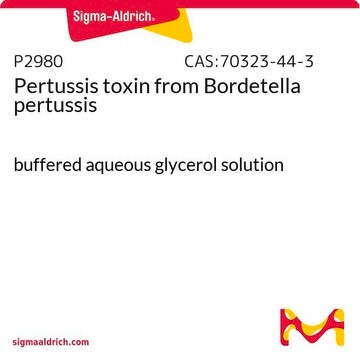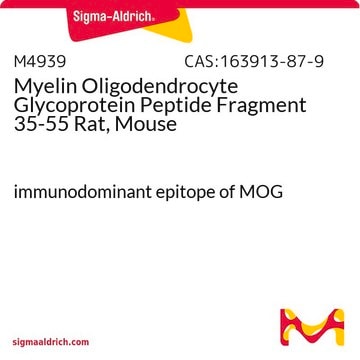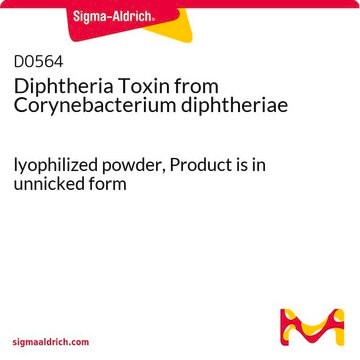516561
Pertussis toxin
from Bordetella pertussis, Five distinct bands by SDS-PAGE, liquid, protein endotoxin, Calbiochem
Synonym(s):
Pertussis Toxin, Bordetella pertussis, Glycerol Solution
About This Item
Recommended Products
product name
Pertussis Toxin, Bordetella pertussis, Glycerol Solution, Pertussis Toxin, Bordetella pertussis, Glycerol Solution, CAS 70323-44-3, is a protein endotoxin that catalyzes ADP-ribosylation of guanine nucleotide-binding regulatory proteins.
Quality Level
form
liquid
manufacturer/tradename
Calbiochem®
storage condition
OK to freeze
shipped in
wet ice
storage temp.
−20°C
General description
Biochem/physiol Actions
Guanine nucleotide-binding regulatory proteins
Warning
Physical form
Reconstitution
Analysis Note
Other Notes
Gierschik, P. 1992. Curr. Topics Microbiol. Immunol.175, 69.
Harada, J., et al. 1992. Eur. J. Pharmacol.227, 301.
Hausman, S.Z., and Burns, D.L. 1992. J. Biol. Chem.267, 13735.
Kaslow, H.R., and Burns, D.L. 1992. FASEB J.6, 2684.
Zhu, J., et al. 1992. J. Pharmacol. Exp. Therap.263, 1479
Kaslow, H.R., et al. 1987. Biochemistry26, 123.
Hewlett, E.L., et al. 1983. Infect. Immun.40, 1198.
Moss, J., et al. 1983. J. Biol. Chem.258, 11879.
Legal Information
Storage Class Code
10 - Combustible liquids
WGK
WGK 2
Regulatory Listings
Regulatory Listings are mainly provided for chemical products. Only limited information can be provided here for non-chemical products. No entry means none of the components are listed. It is the user’s obligation to ensure the safe and legal use of the product.
JAN Code
516561-UG:
516561-50UG:
516561-0UG:
516561-200UG:
Certificates of Analysis (COA)
Search for Certificates of Analysis (COA) by entering the products Lot/Batch Number. Lot and Batch Numbers can be found on a product’s label following the words ‘Lot’ or ‘Batch’.
Already Own This Product?
Find documentation for the products that you have recently purchased in the Document Library.
Our team of scientists has experience in all areas of research including Life Science, Material Science, Chemical Synthesis, Chromatography, Analytical and many others.
Contact Technical Service




